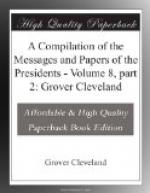I repeat the recommendation of my predecessor in his annual message to Congress in December last in regard to the disposition of the surplus which will probably remain after satisfying the claims of American citizens against China, pursuant to the awards of the commissioners under the act of the 3d of March, 1859. If, however, it should not be deemed advisable to carry that recommendation into effect, I would suggest that authority be given for investing the principal, over the proceeds of the surplus referred to, in good securities, with a view to the satisfaction of such other just claims of our citizens against China as are not unlikely to arise hereafter in the course of our extensive trade with that Empire.
By the act of the 5th of August last Congress authorized the President to instruct the commanders of suitable vessels to defend themselves against and to capture pirates. This authority has been exercised in a single instance only. For the more effectual protection of our extensive and valuable commerce in the Eastern seas especially, it seems to me that it would also be advisable to authorize the commanders of sailing vessels to recapture any prizes which pirates may make of United States vessels and their cargoes, and the consular courts now established by law in Eastern countries to adjudicate the cases in the event that this should not be objected to by the local authorities.
If any good reason exists why we should persevere longer in withholding our recognition of the independence and sovereignty of Hayti and Liberia, I am unable to discern it. Unwilling, however, to inaugurate a novel policy in regard to them without the approbation of Congress, I submit for your consideration the expediency of an appropriation for maintaining a charge d’affaires near each of those new States. It does not admit of doubt that important commercial advantages might be secured by favorable treaties with them.
The operations of the Treasury during the period which has elapsed since your adjournment have been conducted with signal success. The patriotism of the people has placed at the disposal of the Government the large means demanded by the public exigencies; Much of the national loan has been taken by citizens of the industrial classes, whose confidence in their country’s faith and zeal for their country’s deliverance from present peril have induced them to contribute to the support of the Government the whole of their limited acquisitions. This fact imposes peculiar obligations to economy in disbursement and energy in action.
The revenue from all sources, including loans, for the financial year ending on the 30th of June, 1861, was $86,835,900.27, and the expenditures for the same period, including payments on account of the public debt, were $84,578,834.47, leaving a balance in the Treasury on the 1st of July of $2,257,065.80. For the first quarter of the financial year ending on the 30th of September, 1861, the receipts from all sources, including the balance of the 1st of July, were $102,532,509.27, and the expenses $98,239,733.09, leaving a balance on the 1st of October, 1861, of $4,292,776.18.




